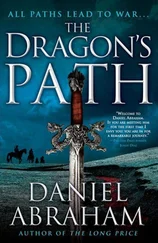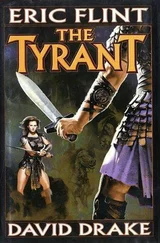“No. I don’t want him to be part of this. Not directly, anyway,” she said, leaning close to him and speaking softly. “If I find myself invited to tea or a sewing circle because of his place in the court, I won’t be so rude as to refuse. But I won’t use him without his knowledge, and I won’t have him know.”
“I can respect that,” Vincen said.
“And I’m not going to send the army’s orders to the enemy. I’m not a traitor.”
“If you say so, m’lady,” Vincen said.
At the edge of the yard, a traveling theater company had set up their stage. A round-faced girl and an older man lit a hundred candles in tin reflectors set all along the stage’s edge. Beyond them, the deeper dark of the Division, and then the torches and lanterns of the far side, as distant, it seemed, as stars.
She drank the yeasty, thick beer and wondered whether she might be a traitor. Geder Palliako was, after all, the crown. His failure and the failure of the empire were difficult threads to tease apart. She had risked her own life for King Simeon, and without regret. If anything, she felt herself more a patriot now, standing against the crown, than she had standing with it.
But Jorey had been right. The world wasn’t what it was a year ago. The Severed Throne as she’d known it was gone. The buildings might be the same, the city, even the people, but the nature of the empire—its soul—had changed. It might be possible to betray this new empire and not what it had been. A loyal traitor, then? It seemed absurd and enticing both. She wondered whether one could be faithful to the past and yet not be bound by its rules. Perhaps it was only the beer, but the question seemed heavy with importance.
“Do you know—” she began, but Vincen shook his head and gestured toward the stage.
“Show,” he said.
A dark-haired woman had taken the stage, her smile haughty and wild.
“Come!” she cried, her voice filling the darkness. “Gather near, my friends, or if you are faint of heart, move on. For our tale is one of grand adventure. Love, war, betrayal, and vengeance shall spill out now upon these boards, and I warn you not all that are good end well. Not all that are evil are punished.” Clara felt her throat growing thick, her heart beating faster. The words seemed like a threat. Or worse, a promise. “Come close, my friends, and know that in our tale as in the world, anything may happen.”
Geder
The first battle of the war came at a garrison ten miles from the low hills that marked the border. Ice still clung to the edges of the creek, and snow lurked at the roots of the trees and the northern sides of the walls where the sun could not reach them. Lord Ternigan led the vanguard himself, waiting until midday when the sun offered the enemy no advantage. If the soldiers of the keep had taken the field, it would have been the work of an hour, but instead the iron and oak doors closed, and Ternigan’s men withdrew to prepare their brief and bloody siege.
“Why didn’t they just go around it?” Aster asked.
Geder tapped his lips with the reports, thinking. In truth, he’d been in the field considerably less than Ternigan had, and though he had read deeply on the theory, practice, and history of war, the analysis of men who’d spent more years conducting it was still sometimes obscure to him. He felt Aster deserved an answer, though, and he did his best.
“If you just go on, then you leave them at your back,” he said, fairly certain that was right. “An enemy you haven’t destroyed utterly could always regain strength and come at you.”
Aster’s brow ceased as the boy considered this, then he nodded.
“Go on,” the boy said. “Keep reading.”
The forces of Antea outnumbered the garrison keep by easily five men for every Timzinae or Jasuru, but the keep walls were well made and maintained. Ternigan began by sending a squad of archers and hawkers to the east to bring down any rider or bird sent to alert the enemy or call for aid. The siege engines were constructed in the dim evening just beyond arrowshot of the keep’s walls. In the night, Ternigan patrolled to slaughter the fleeing enemy, and caught and killed nearly a dozen. The priests that had come with the army spoke their sermon by firelight, and their words—that the destiny of Antea to bring peace to the world began here, that the spirits of the dead would ride with them in the morning and make their assault unstoppable, that the rising tide of war would lift them all to glory—so filled the men with lust for battle that Lord Ternigan had to argue against making a night attack.
In the morning, with spring frost still glazing the tents—
“Oh that’s nice,” Aster said.
“Ternigan’s reports do have a certain poetry,” Geder agreed. Basrahip, sitting a little apart, coughed out a short laugh.
In the morning, with spring frost still glazing the tents, Ternigan called the attack. The desperation and fear of the defenders came clear at the start. The rain of arrows and stones held no reserve, and a cunning man hidden in the keep’s walls threw great gouts of living flame from the keep’s single tower. The crew of a battering ram was lost to the flames before a bolt brought the cunning man down. When a second crew began to falter under the defenders’ arrows, Ternigan had called the charge, bringing the body of the army up behind them. With their own men blocking the path of retreat, the men’s resolve stiffened, and at the last, Ternigan dismounted, putting his own hand to the ram for the final dozen critical blows.
When the keep’s doors fell at last, Ternigan led the charge. There were few Timzinae and Jasuru in the keep, but they were wild with despair. Rooting them out took the better part of the day and took its toll in men, including Ternigan’s own squire. But the sun set on the banners of Antea flying above the conquered keep, and the first true victory of the war could now be unequivocally announced.
Geder folded the last page and dropped it on his desk. His private rooms in the heart of the Kingspire were grand and beautiful—carved stone and rich tapestry, wide vaulted ceilings. The gentle light of the afternoon sun filtered through the finest glass in the world. The scent of lavender and lamp oil filled the air. They were also home now, the place where Geder could retreat from the demands of the court. Here, he could rest at ease with his velvets undone and scratch himself when he itched. Aster sat at the great table where Daskellin had had a map of Sarakal, Elassae, the Free Cities, and southern Antea built. It wasn’t as detailed as the war rooms dedicated to the re-creation of the paths of armies and the death of cities, but it served as a good general reminder of the shape of things. Here was Nus, there the thin green threads of the dragon’s roads, at the southern edge the mountains that kept Sarakal from fading into Elassae, and the far city of Inentai that guarded the mountains’ end. Each keep and holdfast was marked by a tiny pewter model. Geder leaned forward, plucked the first of these from the dirt of the map, and put it back in place with the red banner of the spider goddess with its eightfold sigil flying from its minute rooftop.
“Do you think it’s true?” Aster asked.
“What bit?” Geder asked.
“Do you think it was really like that? With Lord Ternigan taking the battering ram and the frost on the tents and the cunning man calling up flames?”
“That part, I don’t know. The number of lost soldiers is probably accurate or nearly so. I have other men who can confirm all that. And how long it took to win the keep. The things that can be measured and counted, I don’t think he’d dare exaggerate. But the rest?”
“You think he lied?”
Читать дальше










